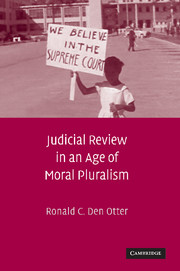Book contents
- Frontmatter
- Contents
- Acknowledgments
- Introduction
- 1 Public Justification and Constitutional Theory
- 2 Freedom and Equality in Constitutional History
- 3 The Challenge of Public Justification
- 4 Competing Conceptions of Public Reason
- 5 Constitutional Public Reason
- 6 The Limits of Public Justification
- 7 Standard Objections to Public Reason
- 8 Easier Cases
- 9 Harder Cases
- 10 The Case for Judicial Review
- Conclusion
- References
- Index
- References
5 - Constitutional Public Reason
Published online by Cambridge University Press: 17 December 2010
- Frontmatter
- Contents
- Acknowledgments
- Introduction
- 1 Public Justification and Constitutional Theory
- 2 Freedom and Equality in Constitutional History
- 3 The Challenge of Public Justification
- 4 Competing Conceptions of Public Reason
- 5 Constitutional Public Reason
- 6 The Limits of Public Justification
- 7 Standard Objections to Public Reason
- 8 Easier Cases
- 9 Harder Cases
- 10 The Case for Judicial Review
- Conclusion
- References
- Index
- References
Summary
In the previous chapter, I reviewed the three basic principles of public reason – laissez-faire, exclusion, and inclusion – and described their strengths and weaknesses. In this chapter, I defend an exclusive principle of public reason as the best interpretation of an ideal of public justification. Such a principle, where the set of public reasons is narrow, is more likely to lead to publicly justified laws and judicial decisions under conditions of moral pluralism. This defense is partially based on the claim that an exclusive principle of public reason better squares with the requirements of judging. An exclusive principle would require “exceedingly persuasive justification” for the law in question, which would be more difficult for the state to satisfy than the alternative principles of public reason in fundamental rights and equal protection cases. When legislation involves constitutional essentials, the state must produce reasons that an ideal reasonable dissenter could not reject, or else the law in question is unconstitutional. The constitutional requirement that the most important laws be unquestionably publicly justified would foster the same basic equal legal rights for all of the members of the political community.
The use of an exclusive principle also would help those who read judicial opinions to know when the Court has decided a case incorrectly. That is more important than it may seem. A morally pluralistic society like our own always has been, and always will be, trying to temper the moral disagreement that causes political conflict.
- Type
- Chapter
- Information
- Judicial Review in an Age of Moral Pluralism , pp. 139 - 171Publisher: Cambridge University PressPrint publication year: 2009



